Today’s Wordless Wednesday photo was taken by Denise Gorski and sent to me by Deputy Jeff Tock of Allegion. During a 1:00 a.m. fire alarm, Denise took note of the damaged latchset on the hotel’s stairwell fire door. If the door wasn’t propped open with a wedge, the missing lever may have prevented hotel guests from exiting. Which is worse? The open door or the potential lack of egress??
You need to login or register to bookmark/favorite this content.

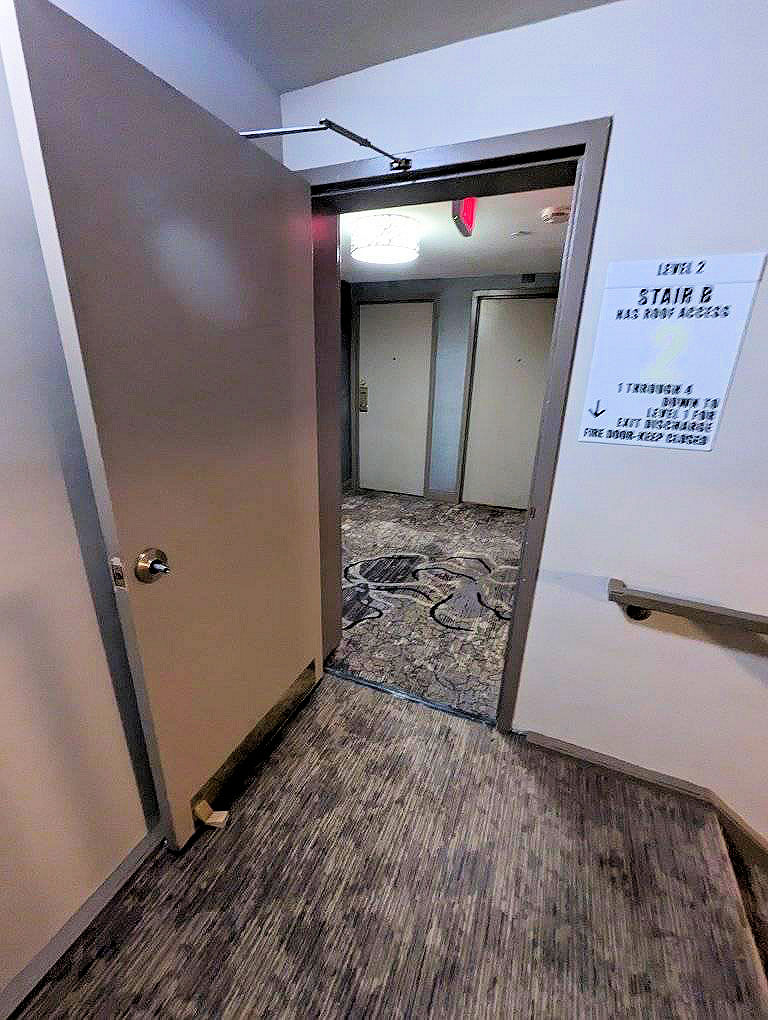

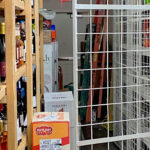
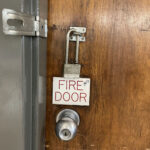



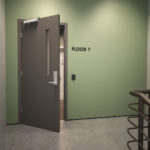
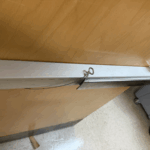
This looks like the kind of thing one’d do when the replacement for the broken lever’s on a month’s backorder. That said — what would a Code-compliant (or at least, in the spirit of the Codes) temporary solution look like? Attaching something to what’s left of the spindle so that the door still can be used while the replacement lever is winding its way to the hotel?
I think there should be some way to get a temporary latchset if the correct lever style and finish were backordered.
– Lori
If I were to weigh these two violations, I would say the inoperative door hardware would be more dangerous. If the corridor pattern is typical of a hotel with a long linear corridor with exit enclosures at each end, this situation could trap the occupants of the entire floor. If fire or smoke appeared in the corridor and someone tried to exit and the room door locked behind them, they might be trapped in a dead-end corridor surrounded by locked room doors and no way out.
Both derangements are dangerous. I wonder if the people responsible for this building have ever been enlightened as to the potential for disaster and importance of continuous maintenance of safety equipment. If some of the actual pictures of the disastrous results could be noised about in all types of public information forums, news articles for example, an educated public could spot danger for themselves and insist building personnel attend to problems at once. If I were still active, I would carry a pamphlet of some of these pictures with me to inspections. I have a haunting picture of a small little girl’s outline including her hair, in soot on her bed sheet where she perished from smoke inhalation in my files. It appeared in NFPA Fire Journal many years ago. Do we make use of pictures of what has happened to our effective advantage?
Both are bad, but I would have to say lack of egress would be more egregious. Hotels are the worst.
First. Did the person who took this picture report this problem? This would have made me move my room to a different floor AND report the problem. Maybe even a different hotel. This is death looking for a reason.
Fixing this problem is simple; take a lock from somewhere else that is not so involved with the means of egress. A closet or whatever. This kind of thing is inexcusable. Like you, I have seen what happens when folks cannot get out (fortunately in pictures only) and suddenly, that image of piled up dead people came up.
Hi Jim –
Yes, she did report the problem.
– Lori
Don’t worry I gave the night security manager an earful then posted on Facebook (where my friend Jeff Tock found it)
All things considered the door most likely should have had an exit device, Fire Exit Hardware to begin with.
Hi Richard –
Current codes would not have required fire exit hardware if the floor only had hotel rooms (no assembly spaces), but fire exit hardware would probably have been more durable!
– Lori
There was a time when the codes allowed certain fire doors to be held closed with just the holding force of a door closer and without a positive latch. While far from ideal, in this situation, since the door was equipped with a closer, simply removing the latch might have been a less risky choice for a short term “fix”… goodness knows there is no shortage of doors out there with taped down latches.
As has been noted, both issues are egregious. Without a doubt, the inability to use an EXIT is dangerous, but similarly, propping a fire door open allows the potential for a fire on that floor to contaminate the safe egress stairwell for all floors. Hotels must understand the importance of immediate corrective action for essential devices. Violation of fire doors, alarms, sprinkler, etc should carry heavy enough fines that they take notice and make the corrections without hesitation. You cannot count on people to “do the right thing”, but you can nearly always count on them doing the thing that costs them the least.